2014 年北京科技大学翻译硕士英语考研真题
北 京 科 技 大 学
2014 年硕士学位研究生入学考试试题
==============================================================================
试题编号:
211
试题名称:
翻译硕士英语
适用专业:
翻译
说明: 所有答案必须写在答题纸上,做在试题或草稿纸上无效。
==============================================================================
I. Vocabulary and Structure ( 30 points, 1 point each, 60 minutes)
Directions:Beneath each sentence there are four words or phrasesmarked A, B, C,
orD.Choosetheanswerthatbestcompletesthesentence.Writeyouranswersonthe
answer sheet.
1. It was nearly always organized by the government, although some club members
acted _______ their own initiative.
A. by
B. on
C. with
D. in
2. He redesigned the process, thereby ________ the company thousands of dollars.
A. saving
B. to save
C. saved
D. save
3. Modern bodies are especially ______ to cancer, because technology produces waste
that inhibits their proper functioning.
A. relevant
B. invulnerable
attractive
C. prone
D.
4. Some of his plans were impractical and ________ good for his work, but he never
wavered in what he considered just.
A. too much
B. much too
C. so much
D. much so
5. Supporters praised the action as a speedy and judicious solution, but critics
condemned it as ______ and unfairly influenced by recent events.
A. delayed
B. indisposed
C. hasty
D. imperious
6. It is odd that a person’s worth is measured by his wealth, ______ instead
people’s character should be measured by their value to society.
A. while
D. when
C. because
B. so
7. During the 17th century many artists became involved in color theory and ______
�
painting for enlightenment.
A. looked up to
B. looked out
C. looked on
D. looked to
8. No government can meet the _______ demand for ever more sophisticated medical
technology by an aging population.
B. insatiable
A. intransigent
C. ingenious
D. inglorious
9. It is difficult to distinguish between the things that celebrities do ______
and those that are carefully contrived for effect.
A. reluctantly
B. publicly
C. spontaneously
D.
prolifically
10. The monkeys in the zoo are a group, because primates are inevitably ______ and
build their lives around each other.
A. social
B. independent
C. stable
D. curious
11. When economy, language, culture and history interact, people begin to view them
as _______ subjects rather than isolated ones.
A. idiosyncratic
B. integral
C. synchronized
D.
synthesized
12. Retired people are often willing to _______ their time to help with community
project.
A. give out
B. give away
C. give of
D. give off
13. Even though formidable winters are the norm in this region, people were
unprepared for the _______ of the blizzard that year.
A. mildness
B. ferocity
C. inevitability
D.
probability
14. The committee provides funding to _______ artists like those of women and of
color, in the hopes of rectifying a historical inequality.
A. prolific
B. prominent
C. promising
D.
marginalized
15. All are in the _____ stages, until architectural historians survey each house
to determine which have historic value.
A. preliminary
predicative
B. primary
C. prevalent
D.
16. He has unusual insight and imagination, which has made him succeed in ______
new and fundamental principles well in advance of their general recognition.
A. coordinating
C. acknowledging
B. discerning
D. dispelling
17. The storyline of the novel was extremely involved and included many lesser
�
characters _______ to the central events.
A. consequential
permeating
B. peripheral
C. indispensable
D.
18. Once I finally _______ finding a definition, I see that it was never any such
thing.
A. get across to
with
B. get away with
C. get round to
D.
get
in
19. Despite the fact that the life span of animals is conveniently divided into
separate stages, those periods are not truly _______.
A. distinct
B. continuous
C. reflexive
D. codependent
20. In spite of _______ among scientists, and years of contentious discussion, the
claim that earthquake can be predicted with great precision prevails.
A. reception
B. popularity
C. skepticism
D. antipathy
21. No dictionary can really capture something as fleeting and ______ as slang.
A. equivocal
ephemeral
B. equitable
C. equable
D.
22. They bought up pieces of old furniture and passed them ______ as valuable
antiques.
A. out
B. by
C. away
D. off
23. That reason was unique human has come _____ increasingly skeptical scrutiny:
more researchers at least entertain the notion that some animals can think.
A. in
B. under
C. to
D. with
24. Sam was a complete country man, with a pronounced ______ with nature in all its
forms.
A. infinity
B. conformity
C. affinity
D. fluidity
25. It is no accident that most people find his book disturbing, for it is calculated
to undermine a number of beliefs they have long _______.
A. cherished
C. anticipated
B. denied
D. misunderstood
26. Although the passage of years has softened the initially hostile reaction to
his poetry, even now only a few independent observers _______ his works.
A. neglect
B. criticize
C. comment
D. praise
27. The exhibition, though small in scale, succeeded in _______ its members with
a firm sense of self-worth and purpose.
A. endowing
B. imbuing
C. ladening
D. providing
�
28. We were all impressed by the style of his books which is strongly ________ of
Virginia Woolf’s novels.
A. reminiscent
B. symptomatic
imitative
C. indicative
D.
29. Historian can _______ “Augustan peace” only by failing to recognize that this
peace in many respects resemble that of death.
A. demand
B. ridicule
C. applaud
D. disapprove
30. Everything becomes collectable in time, particularly when its history and date
of manufacture can be ________.
A. described
B. acknowledged
authenticated
C. overlooked
D.
II. Reading Comprehension (40 points, 2 points each, 60 minutes)
Section I
Directions: In this section there are two reading passages followed by multiple
choicequestions.Readthepassagesandthenwriteyouranswersonyouranswersheet.
Passage One
Constant vigilance: that is the task of the people who protect society from
enemies intent on using subterfuge and violence to get their way. It is also the
watch word of those who fear that the protectors will pursue the collective interest
at untold cost to individual rights. Edward Snowden, a young security contractor,
has come down on one side of that tussle by leaking documents showing that the
National Security Agency (NSA) spied on millions of Americans’ phone records on
the internet activity of hundreds of millions of foreigners.
The documents, published by the Guardian and the Washington Post, include two
big secrets. One is a court order telling Verizon, a telecoms company, to hand over
“metadata”, such as the duration, direction and location of subscribers’ calls.
The other gives some clues about a programme called PRISM, which collects e-mails,
files and social-networking data from firms such as Google, Apple and Facebook. Much
of this eavesdropping has long been surmised, and none of it is necessarily illegal.
America gives wide powers to its law-enforcement and spy agencies. They are overseen
by Congress and courts, which issue orders to internet firms.
Barack Obama has responded to the leaks by saying that he “welcomes” a debate
on the trade-off between privacy, security and convenience. Despite the president’s
words, however, the administration and much of Congress seem unwilling to talk about
the programmes they oversee; and the politicians and executives who do want to speak
out are gagged by secrecy laws. Opinion polls show that Americans are divided about
�
the merits of surveillance—which is partly because they know so little about what
is going on. But spying in a democracy depends for its legitimacy on informed consent,
not blind trust.
You might argue that the spies are doing only what is necessary. Al-Qaeda’s
assaults on September 11th 2001 demonstrated to politicians everywhere that their
first duty is to ensure their own citizens’ safety. With Islamist bombers, there
is a good case for using electronic surveillance: they come from a population that
is still hard for Western security services to penetrate, and they make wide use
of mobile phones and the internet. The NSA’s boss, Keith Alexander, says the ploys
revealed by Mr Snowden have stopped dozens of plots. The burden on society of sweeping
up information about them has been modest compared with the wars launched against
Afghanistan and Iraq. And the public seems happy: if there were another attack on
America, Mr Snowden would soon be forgotten.
Yet because the spies choose what to reveal about their work, nobody can judge
if the cost and intrusion are proportionate to the threat. One concern is the size,
scope and cost of the security bureaucracy: some 1.4 million people have “top
secret” clearances of the kind held by Mr Snowden. Is that sensible?
A second worry is the effect on America’s ties with other countries. The
administration’s immediate response to the PRISM revelation was that Americans have
nothing to fear: it touched only foreigners. That adds insult to injury in countries
that count themselves as close American allies: the European Union, in particular,
fastidiously protects its citizens’ data. Fears abound that the spy agencies
practice a cynical swap, in which each respects the letter of the law protecting
the rights of its own people—but lets its allies do the snooping instead.
Lawyerly officials denials of such machinations fail to reassure because of the
third worry: the governments acting outside public scrutiny are not to be trusted.
James Clapper, America’s director of national intelligence, told Congress in March
that the NSA does not gather data on “millions of Americans”. He now says he
answered in “the least untruthful manner” possible. Trawls through big databases
may produce interesting clues—but also life-ruining false alarms, especially when
the resulting decisions are cloaked in secrecy. Those on “no-fly lists”, which
ban an unknown number of people from most air travel, are not told what they have
done wrong and cannot clear their names. In desperation, 13 American citizens,
including some who were exiled from their own country by the travel ban, are suing
the government.
Our point is not that America’s spies are doing the wrong things, but that the
level of public scrutiny is inadequate and so is the right of redress. Without these,
officials will be tempted to abuse their powers, because the price of doing so is
small. This is particularly true for those who bug and ban.
Spooks do need secrecy, but not on everything, always and everywhere. Officials
will complain that disclosure would hinder their efforts in what is already an unfair
fight. Yet some operational efficiency is worth sacrificing, because public scrutiny
is a condition for popular backing. Even allowing for the need to keep some things
clandestine, Americans need a clearer idea of what their spies are doing in their
�
name.
1. According to the passage, which of the following statements about vigilance is
true?
A. President Obama describes the spying as a defense of security.
B. Americans differ in their attitude towards the government’s vigilance.
C. The administration and Congress feel ashamed of the spying.
D. America’s law-enforcement and spy agencies are not entitled to spy.
2. The sentence in paragraph two “if there were another attack on America, Mr
Snowden would soon be forgotten” probably means ________.
A. Americans need divert their attention from the spying event.
B. Mr Snowden matters little compared to America’s potential enemies.
C. Vigilance would be accepted by the public if America was faced with danger.
D. Mr Snowden’s revelation of PRISM would be forgotten sooner or later.
3. Americans have the following concerns regarding vigilance EXCEPT_____.
A. Spy agents leave Americans little privacy and less security.
B. Spying will damage America’s relation with other countries.
C. It is not sensible to devote much money and energy to vigilance.
D. There lacks effective scrutiny of the government’s surveillance.
4. The case that some citizens are banned from air travel in paragraph 7 is presented
to illustrate ________.
A. the efficiency of spying
B. the absurdity of the ban
C. the inadequacy of the spying system
D. the interesting findings of spying
5. What is the author’s stance on vigilance by the government?
A. Vigilance does more harm than good to American citizens.
B. Protection of society is merely an excuse for illegal vigilance.
C. The legitimacy of vigilance is still open to discussion.
D. Vigilance is necessary but should be better scrutinized by the public.
Passage Two
A simple idea underpins science: “trust, but verify”. Results should always
be subject to challenge from experiment. That simple but powerful idea has generated
a vast body of knowledge. Since its birth in the 17th century, modern science has
changed the world beyond recognition, and overwhelmingly for the better. But success
can breed complacency. Modern scientists are doing too much trusting and not enough
verifying—to the detriment of the whole of science and of humanity.
Too many of the findings that fill the academic ether are the result of shoddy
�
or
poor
A
rule
analysis.
biotechnology
experiments
venture-capitalists is that half of published research cannot be replicated. Even
that may be optimistic. Last year researchers at one biotech firm found they could
reproduce just six of 53 “landmark” studies in cancer research. In 2000-2010
roughly 80,000 patients took part in clinical trials based on research that was later
retracted because of mistakes or improprieties.
thumb
of
among
Even when flawed research does not put people’s lives at risks—and much of
it is too far from the market to do so—it squanders money and the efforts of some
of the world’s best minds. The opportunity costs of stymied progress are hard to
quantify, but they are likely to be vast. And they could be rising.
One reason is the competitiveness of science. In the 1950s, when modern academic
research took shape after its successes in the Second World War, it was still a
rarefied pastime. The entire club of scientists numbered a few hundred thousand.
As their ranks have swelled, scientists have lost their taste for self-policing and
quality control. The obligation to “publish or perish” has come to rule over
academic life. Competition for jobs is cut-throat. Full professors in America earned
on average $135,000 in 2012—more than judges did. Every year six freshly minted
PhDs vie for every academic post. Nowadays verification does little to advance a
researcher’s career. And without verification, dubious findings live on to mislead.
Careerism also encourages exaggeration and the cherry-picking of results. In
order to safeguard their exclusivity, the leading journals impose high rejection
rates: in excess of 90% of submitted manuscripts. The most striking findings have
the greatest chance of making it onto the page. Little wonder that one in three
researchers knows of a colleague who has pepped up a paper by, say, excluding
inconvenient data from results “based on a gut feeling”. And as more research teams
around the world work on a problem, the odds shorten that at least one will fall
prey to an honest confusion between the sweet signal of a genuine discovery and a
freak of the statistical noise.
Conversely, failures to prove a hypothesis are rarely even offered for
publication, let alone accepted. “Negative results” now account for only 14% of
published papers, down from 30% in 1990. Yet knowing what is false is as important
to science as knowing what is true. The failure to report failures means that
researchers waste money and effort exploring blind alleys already investigated by
other scientists.
The hallowed process of peer review is not all it is cracked up to be, either.
When a prominent medical journal ran research past other experts in the field, it
found that most of the reviewers failed to spot mistakes it had deliberately inserted
into papers, even after being told they were being tested.
All this makes a shaky foundation for an enterprise dedicated to discovering
the truth about the world. What might be done to shore it up? One priority should
be for all disciplines to follow the example of those that have done most to tighten
standards. Ideally, research protocols should be registered in advance and monitored
in virtual notebooks. This would curb the temptation to fiddle with the experiment’s
design midstream so as to make the results look more substantial than they are. Where
�
possible, trial data also should be open for other researchers to inspect and test.
The most enlightened journals are already becoming less averse to humdrum papers.
Some government funding agencies, including America’s National Institutes of
Health, which dish out $30 billion on research each year, are working out how best
to encourage replication. And growing numbers of scientists, especially young ones,
understand statistics. But these trends need to go much further. Journals should
allocate space for “uninteresting” work, and grant-givers should set aside money
to pay for it. Peer review should be tightened—or perhaps dispensed with altogether,
in favor of post-publication evaluation in the form of appended comments. Lastly,
policymakers should ensure that institutions using public money also respect the
rules.
Science still commands enormous—if sometimes bemused—respect. But its
privileged status is founded on the capacity to be right most of the time and to
correct its mistakes when it gets things wrong. And it is not as if the universe
is short of genuine mysteries to keep generations of scientists hard at work. The
false trails laid down by shoddy research are an unforgivable barrier to
understanding.
6. Which issue about science is mainly addressed in the passage?
A. Science calls for more verification.
B. Flawed science research does harm to humanity.
C. Fierce competition exists in science.
D. An objective evaluation of science is necessary.
7. Which of the following statements can best explain the major issue in science?
A. Scientific research is too flawed to be turned into productivity.
B. Scientists are unwilling to get papers published for promotion.
C. Competition in science leads to irrational pursuit of startling results.
D. Peer review mechanism is not fully implemented.
8. “cherry-picking of results” in paragraph five refers to ______.
A. overstating the results to get papers published
B. keeping only positive results to get paper published
C. selecting only papers with the most favorable results
D. safeguarding the high quality of experiment results
9. According to the passage, negative results in scientific experiments should be
_____.
A. dismissed as complete failures and never to be considered
B. published to avoid unnecessary waste of money and effort
C. investigated a second time to confirm their inadequacy
D. adapted to incorporate with a new hypothesis
10. The passage suggests the following solutions to the issue in science EXCEPT
�
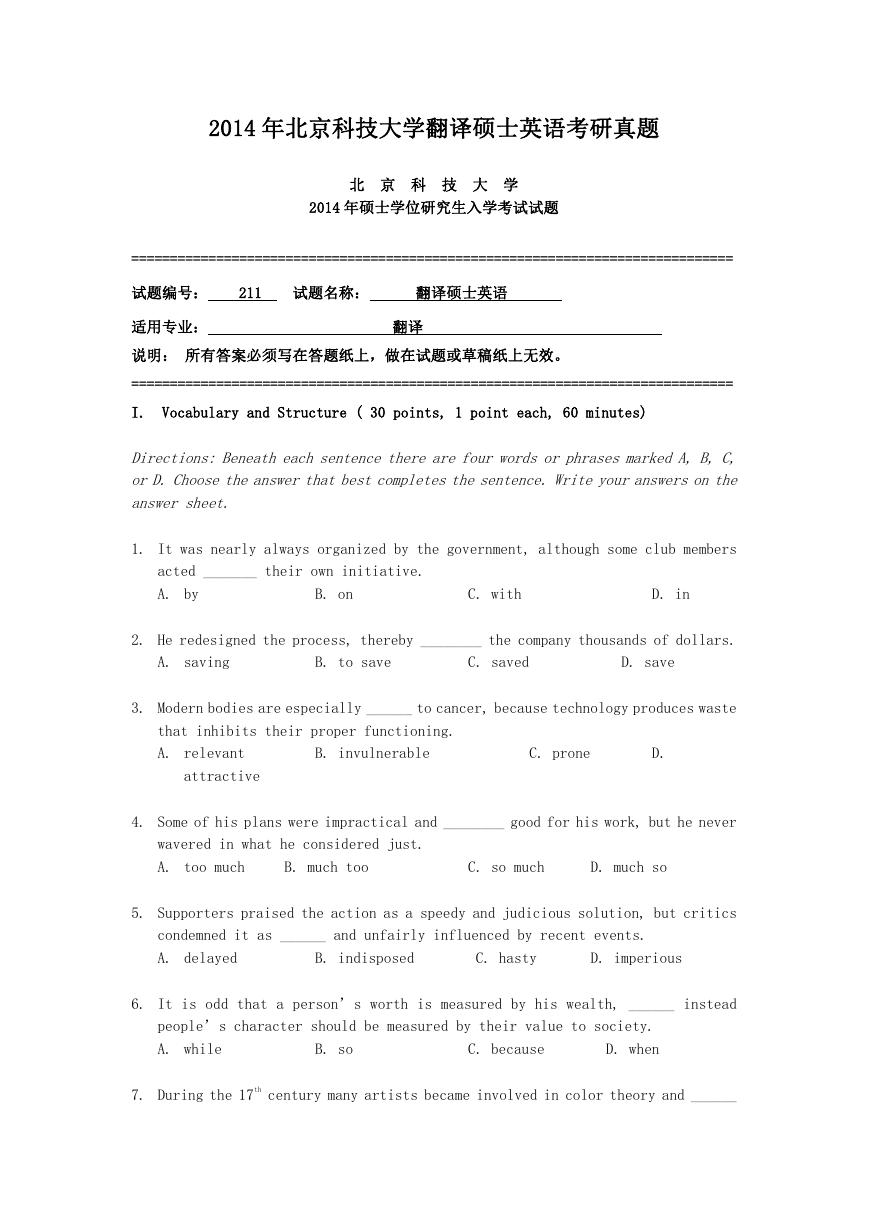
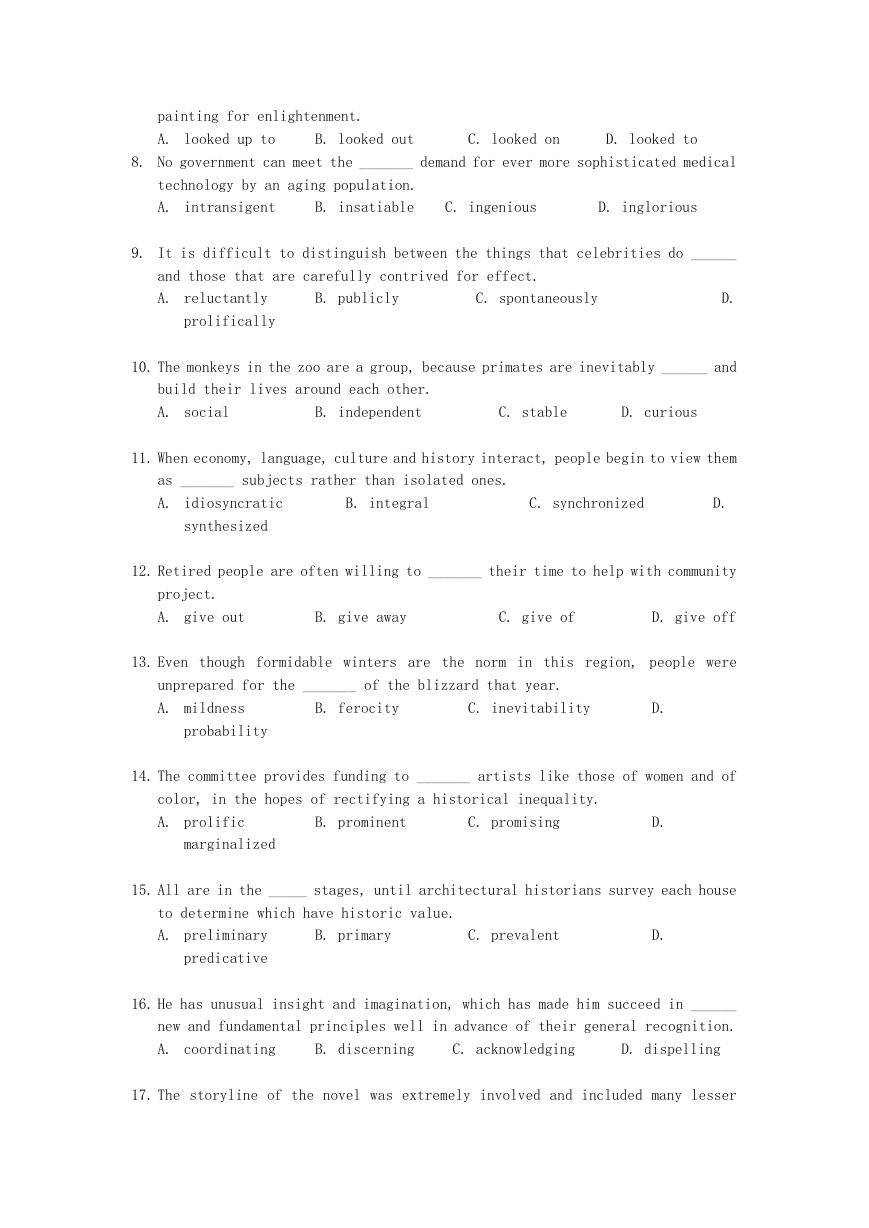


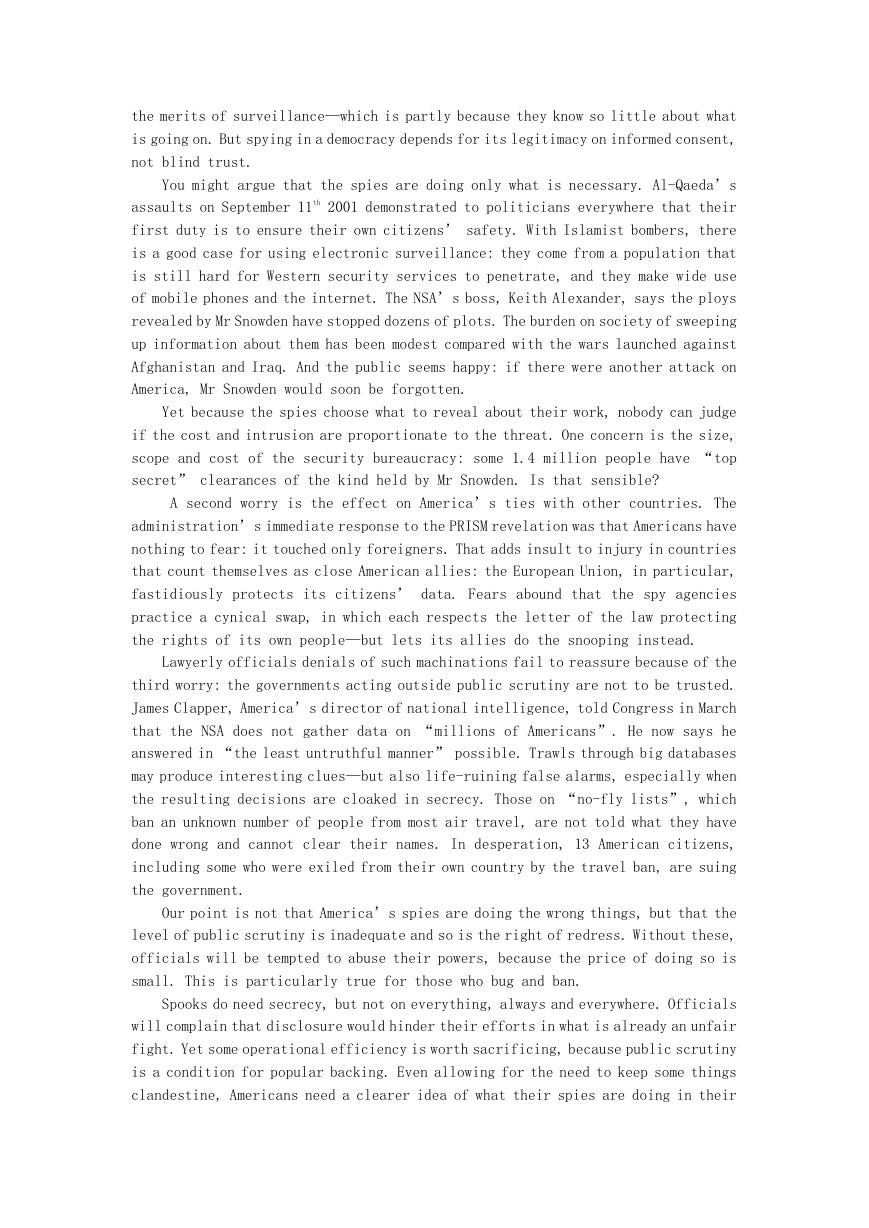
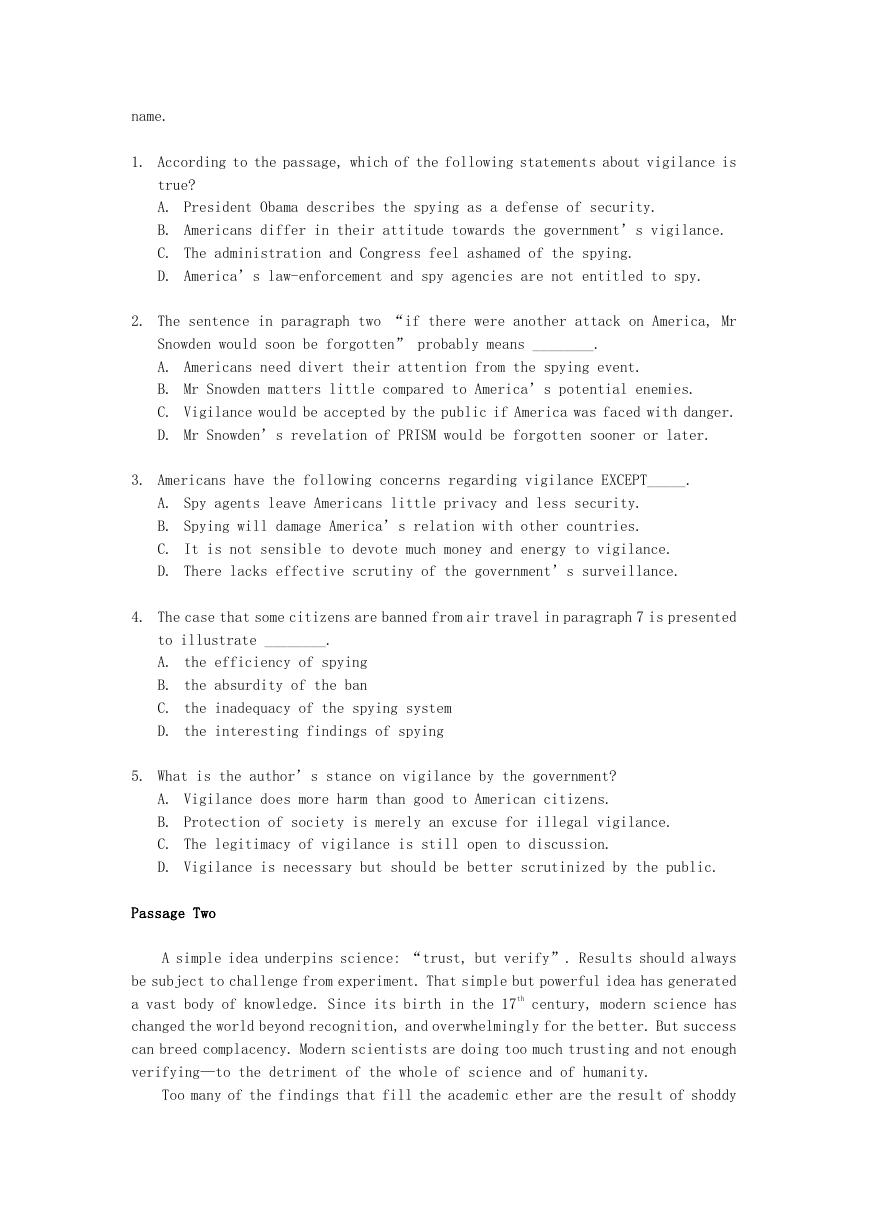
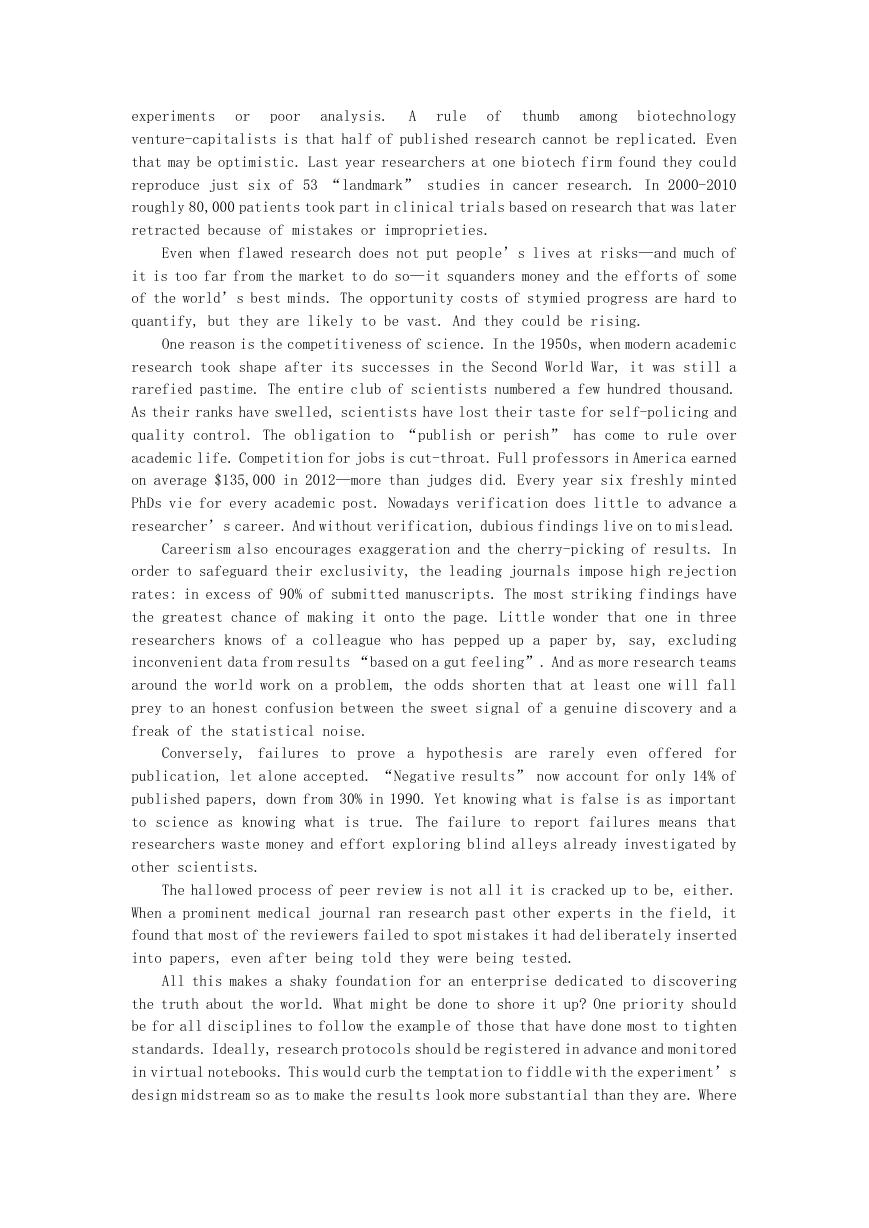
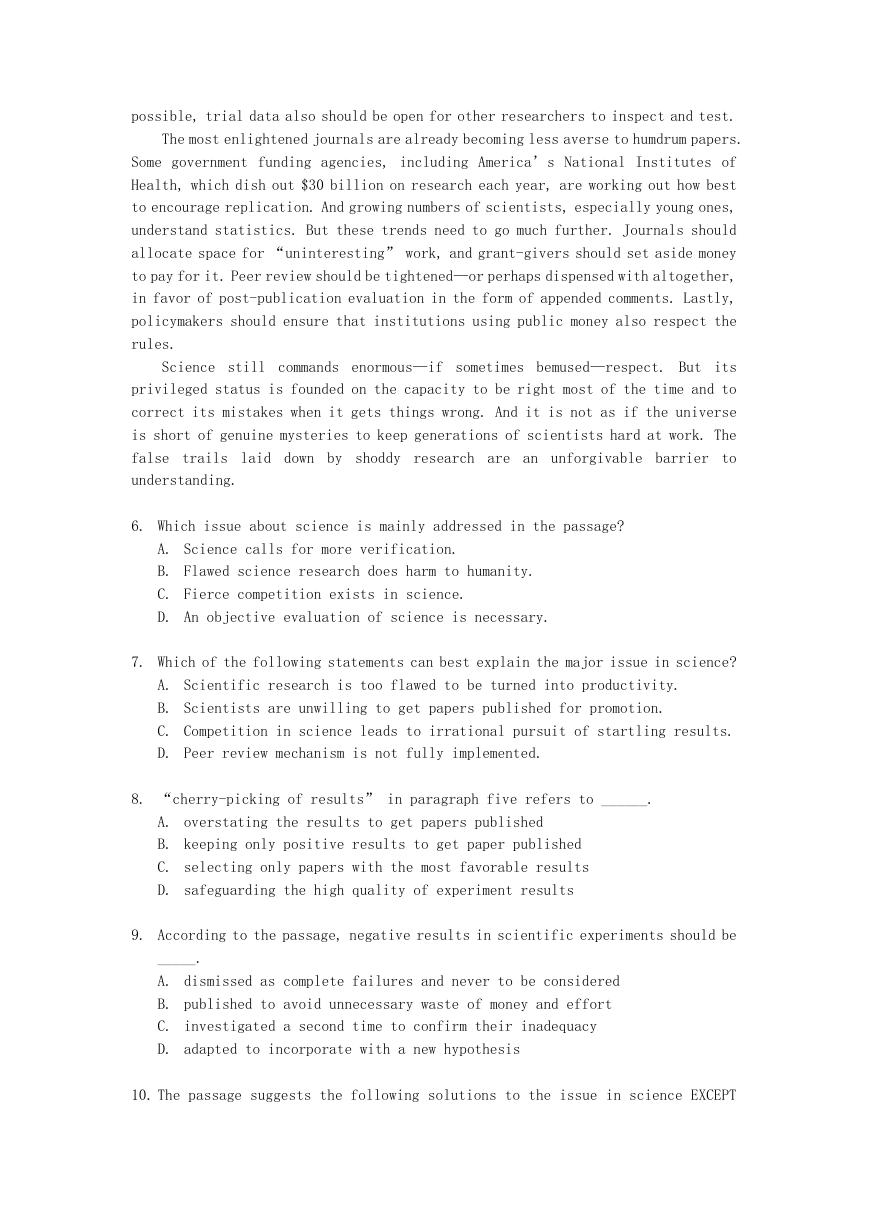








 2023年江西萍乡中考道德与法治真题及答案.doc
2023年江西萍乡中考道德与法治真题及答案.doc 2012年重庆南川中考生物真题及答案.doc
2012年重庆南川中考生物真题及答案.doc 2013年江西师范大学地理学综合及文艺理论基础考研真题.doc
2013年江西师范大学地理学综合及文艺理论基础考研真题.doc 2020年四川甘孜小升初语文真题及答案I卷.doc
2020年四川甘孜小升初语文真题及答案I卷.doc 2020年注册岩土工程师专业基础考试真题及答案.doc
2020年注册岩土工程师专业基础考试真题及答案.doc 2023-2024学年福建省厦门市九年级上学期数学月考试题及答案.doc
2023-2024学年福建省厦门市九年级上学期数学月考试题及答案.doc 2021-2022学年辽宁省沈阳市大东区九年级上学期语文期末试题及答案.doc
2021-2022学年辽宁省沈阳市大东区九年级上学期语文期末试题及答案.doc 2022-2023学年北京东城区初三第一学期物理期末试卷及答案.doc
2022-2023学年北京东城区初三第一学期物理期末试卷及答案.doc 2018上半年江西教师资格初中地理学科知识与教学能力真题及答案.doc
2018上半年江西教师资格初中地理学科知识与教学能力真题及答案.doc 2012年河北国家公务员申论考试真题及答案-省级.doc
2012年河北国家公务员申论考试真题及答案-省级.doc 2020-2021学年江苏省扬州市江都区邵樊片九年级上学期数学第一次质量检测试题及答案.doc
2020-2021学年江苏省扬州市江都区邵樊片九年级上学期数学第一次质量检测试题及答案.doc 2022下半年黑龙江教师资格证中学综合素质真题及答案.doc
2022下半年黑龙江教师资格证中学综合素质真题及答案.doc